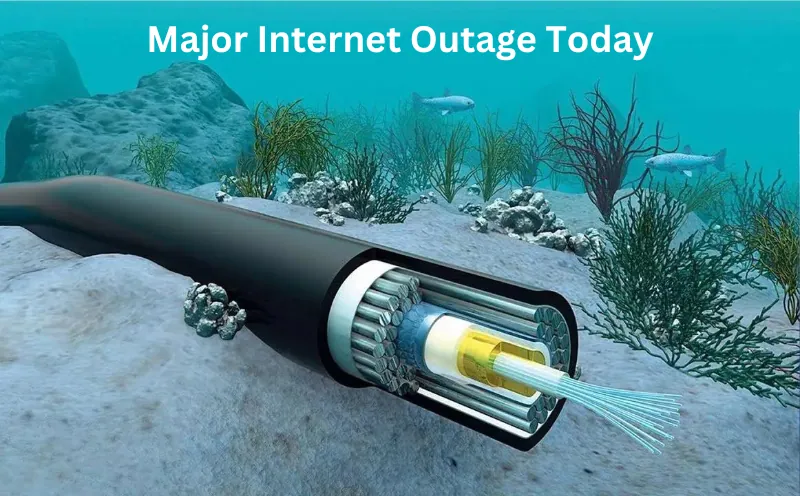In our increasingly digital world, the internet serves as the backbone of communication, commerce, and information sharing. Therefore, when a major internet outage occurs, it can have widespread implications, affecting individuals, businesses, and even governments. Today, we will explore the concept of a major internet outage, delve into the causes and effects, and answer some frequently asked questions regarding this pressing issue.
What Constitutes a Major Internet Outage?
A major internet outage refers to a significant disruption in internet service that affects a large number of users across various regions or even globally. This can manifest as complete loss of connectivity, slow internet speeds, or intermittent access to online services. Major outages can be caused by a variety of factors, including technical failures, cyber attacks, natural disasters, and human error.
Key Characteristics of a Major Internet Outage
- Widespread Impact: A major outage typically affects multiple service providers and regions, leading to a significant number of users unable to access the internet.
- Duration: While some outages may last only a few minutes, major outages can persist for hours or even days, causing considerable disruption to daily activities.
- Affected Services: Major outages often impact a range of online services, including social media platforms, e-commerce sites, cloud services, and communication tools.
- Public Awareness: In today’s connected world, news of a major outage spreads quickly through social media and news outlets, leading to heightened public concern and discussion.
Causes of Major Internet Outages
Understanding the causes of major internet outages is essential for both users and service providers. Here are some of the most common reasons:
1. Technical Failures
Network infrastructure is complex, and failures can occur at various points. This includes hardware malfunctions, software bugs, and issues with routing protocols. For example, a faulty router or a misconfigured server can lead to significant connectivity issues.
2. Cyber Attacks
The rise of cybercrime has made the internet more vulnerable to attacks. Distributed Denial of Service (DDoS) attacks, in which multiple compromised systems target a single system to overwhelm it, can lead to major outages. High-profile cases, such as the 2016 DDoS attack on Dyn, demonstrated how vulnerable internet infrastructure can be to malicious actors.
3. Natural Disasters
Natural disasters such as earthquakes, hurricanes, and floods can physically damage the infrastructure that supports internet connectivity. For instance, a hurricane can destroy data centers or sever undersea cables, leading to widespread outages.
4. Human Error
Mistakes made by network engineers or IT personnel can lead to major outages. This could include incorrectly configuring network devices, accidentally severing cables during maintenance, or deploying flawed software updates.
5. Regulatory and Political Issues
In some cases, government actions or political unrest can lead to internet outages. Governments may impose restrictions on internet access during protests or conflicts, resulting in significant connectivity issues for residents.
The Impact of a Major Internet Outage
The ramifications of a major internet outage are profound and can affect various sectors:
1. Economic Consequences
Businesses that rely on the internet for operations can suffer significant financial losses during an outage. E-commerce companies may lose sales, while service-based businesses may be unable to communicate with clients or process transactions.
2. Communication Breakdown
An internet outage can disrupt communication channels, affecting personal and professional interactions. This can hinder emergency services, delay critical information dissemination, and impact remote work arrangements.
3. Social Media and News Dissemination
Social media platforms often serve as primary sources of news and information. During an outage, the flow of information can be severely disrupted, leading to confusion and misinformation.
4. Public Services
Many public services rely on internet connectivity for operations. An outage can disrupt services such as online banking, public transportation systems, and government services, creating inconvenience for citizens.
FAQs About Major Internet Outages
Q1: How can I check if there is a major internet outage in my area?
You can check for internet outages by visiting websites like DownDetector, which provides real-time information about service disruptions. Additionally, social media platforms can be useful for finding updates from your internet service provider (ISP).
Q2: What should I do during an internet outage?
If you experience an outage, start by checking your devices and router. Restarting your router can sometimes resolve connectivity issues. If the problem persists, contact your ISP for updates and estimated restoration times.
Q3: How can I protect myself from the effects of a major internet outage?
To mitigate the impact of an internet outage, consider having alternative communication methods in place, such as mobile data or landline phones. Keeping important documents and information offline can also be beneficial.
Q4: Are there any warning signs of a potential major internet outage?
While it can be difficult to predict a major outage, signs such as frequent connectivity issues, slow internet speeds, or unusual behavior from online services can indicate potential problems. Keeping an eye on news reports and updates from your ISP can also provide insights.
Conclusion
A major internet outage today serves as a reminder of our dependency on digital connectivity. Understanding the causes, impacts, and preventative measures can help individuals and businesses navigate the challenges posed by such disruptions. As we continue to rely on the internet for nearly every aspect of our lives, it is crucial to remain informed and prepared for the possibility of outages. By fostering resilience and awareness, we can better manage the effects of these disruptions and maintain connectivity in an increasingly digital world.

